Burt A. The Evolution of the British Empire and Commonwealth From the American Revolution
Подождите немного. Документ загружается.

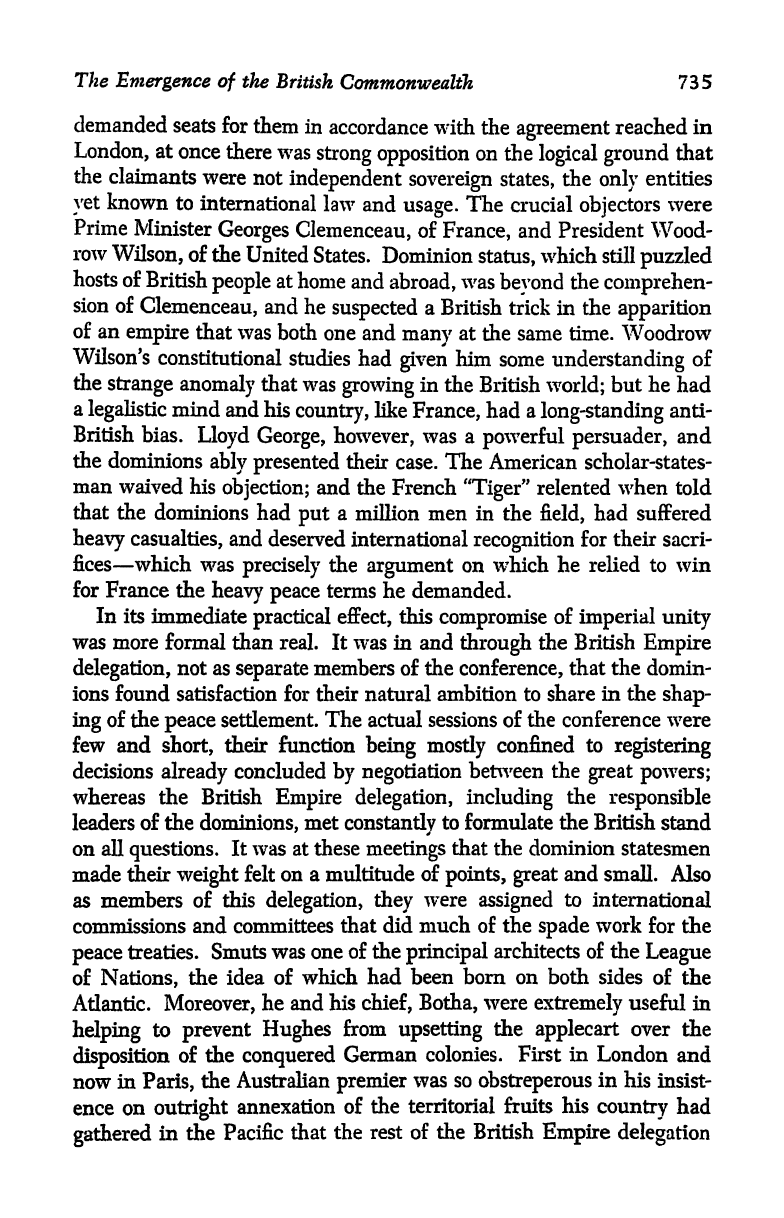
The
Emergence of
the
British
Commonwealth
735
demanded
seats
for
them
in
accordance with
the
agreement
reached
in
London,
at
once there
was
strong
opposition
on the
logical
ground
that
the
claimants
were
not
independent
sovereign
states,
the
only
entities
yet
known
to
international
law
and
usage.
The
crucial
objectors
were
Prime
Minister
Georges
Clemenceau,
of
France,
and
President Wood-
row
Wilson,
of the
United
States.
Dominion
status,
which
still
puzzled
hosts
of
British
people
at
home
and
abroad,
was
beyond
the
comprehen-
sion
of
Clemenceau,
and
he
suspected
a
British trick in the
apparition
of an
empire
that
was
both
one
and
many
at
the
same
time.
Woodrow
Wilson's
constitutional
studies
had
given
him
some
understanding
of
the
strange
anomaly
that
was
growing
in
the
British
world;
but he
had
a
legalistic
mind
and
his
country,
like
France,
had
a
long-standing
anti-
British
bias.
Lloyd
George,
however,
was a
powerful persuader,
and
the
dominions
ably presented
their
case. The American
scholar-states-
man
waived
his
objection;
and the
French
"Tiger"
relented
when
told
that
the
dominions
had
put
a
million
men
in
the
field,
had suffered
heavy
casualties,
and
deserved international
recognition
for
their
sacri-
fices
which was
precisely
the
argument
on which
he relied
to
win
for
France the
heavy peace
terms he demanded.
In
its
immediate
practical
effect,
this
compromise
of
imperial
unity
was
more
formal
than
real.
It was in and
through
the British
Empire
delegation,
not
as
separate
members
of the
conference,
that
the
domin-
ions
found satisfaction for their natural ambition
to
share
in the
shap-
ing
of
the
peace
settlement.
The actual sessions
of
the
conference were
few
and
short,
their function
being
mostly
confined
to
registering
decisions
already
concluded
by
negotiation
between
the
great
powers;
whereas
the
British
Empire delegation, including
the
responsible
leaders
of the
dominions,
met
constantly
to
formulate the British
stand
on
all
questions.
It
was
at
these
meetings
that the
dominion
statesmen
made
their
weight
felt
on a multitude of
points,
great
and
small.
Also
as
members of
this
delegation,
they
were
assigned
to
international
commissions
and
committees
that did
much
of
the
spade
work
for the
peace
treaties. Smuts
was
one
of
the
principal
architects of the
League
of
Nations,
the idea of
which
had
been
born on
both sides
of
the
Atlantic.
Moreover,
he and his
chief,
Botha,
were
extremely
useful in
helping
to
prevent
Hughes
from
upsetting
the
applecart
over
the
disposition
of
the
conquered
German
colonies. First
in
London
and
now
in
Paris,
the Australian
premier
was so
obstreperous
in
his
insist-
ence on
outright
annexation
of
the
territorial
fruits his
country
had
gathered
in the
Pacific
that
the
rest
of
the
British
Empire
delegation
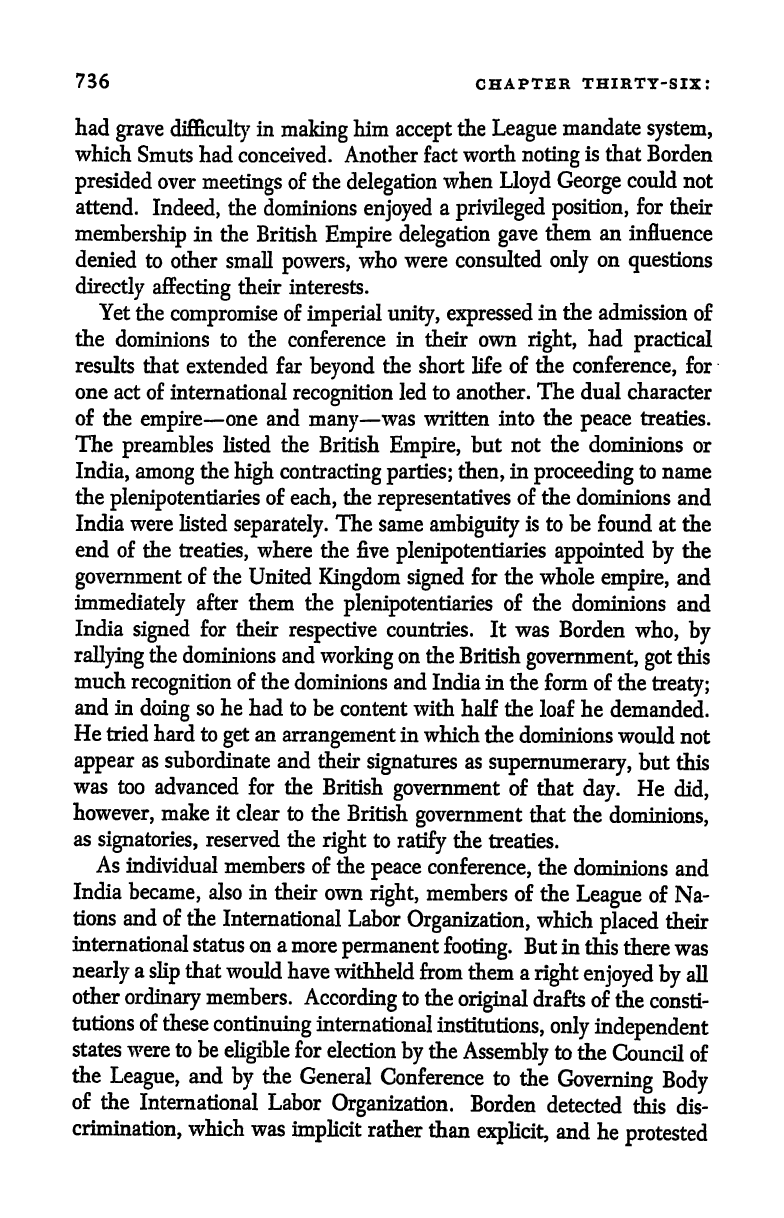
736
CHAPTER
THIRTY-SIX:
had
grave
difficulty
in
making
him
accept
the
League
mandate
system,
which
Smuts had
conceived. Another
fact
worth
noting
is that
Borden
presided
over
meetings
of
the
delegation
when
Lloyd
George
could not
attend.
Indeed,
the
dominions
enjoyed
a
privileged
position,
for
their
membership
in the
British
Empire
delegation
gave
them an
influence
denied to
other small
powers,
who
were consulted
only
on
questions
directly
affecting
their
interests.
Yet
the
compromise
of
imperial
unity,
expressed
in
the
admission
of
the
dominions
to
the
conference
in
their
own
right,
had
practical
results that
extended far
beyond
the short
life
of
the
conference,
for
one
act of international
recognition
led
to another.
The dual character
of
the
empire
one and
many
was written
into
the
peace
treaties.
The
preambles
listed the British
Empire,
but not
the
dominions
or
India,
among
the
high contracting parties;
then,
in
proceeding
to
name
the
plenipotentiaries
of
each,
the
representatives
of the
dominions
and
India were
listed
separately.
The same
ambiguity
is to be found at
the
end of
the
treaties,
where
the five
plenipotentiaries
appointed
by
the
government
of
the United
Kingdom signed
for
the whole
empire,
and
immediately
after them
the
plenipotentiaries
of the
dominions
and
India
signed
for
their
respective
countries. It was
Borden
who,
by
rallying
the
dominions
and
working
on the British
government,
got
this
much
recognition
of the
dominions
and India in
the
form of the
treaty;
and in
doing
so
he
had to be
content with
half
the
loaf he
demanded.
He
tried hard
to
get
an
arrangement
in
which
the
dominions
would
not
appear
as
subordinate
and their
signatures
as
supernumerary,
but
this
was
too
advanced for
the British
government
of
that
day.
He
did,
however,
make it clear
to
the
British
government
that
the
dominions,
as
signatories,
reserved the
right
to
ratify
the
treaties.
As
individual
members of
the
peace
conference,
the
dominions
and
India
became,
also in
their
own
right,
members of
the
League
of Na-
tions
and
of the
International Labor
Organization,
which
placed
their
international
status on
a
more
permanent
footing.
But
in
this
there
was
nearly
a
slip
that
would have
withheld
from
them a
right
enjoyed
by
all
other
ordinary
members.
According
to the
original
drafts of
the
consti-
tutions of
these
continuing
international
institutions,
only
independent
states
were
to be
eligible
for
election
by
the
Assembly
to
the
Council of
the
League,
and
by
the
General
Conference
to
the
Governing
Body
of
the
International Labor
Organization.
Borden
detected
this
dis-
crimination,
which was
implicit
rather
than
explicit,
and
he
protested
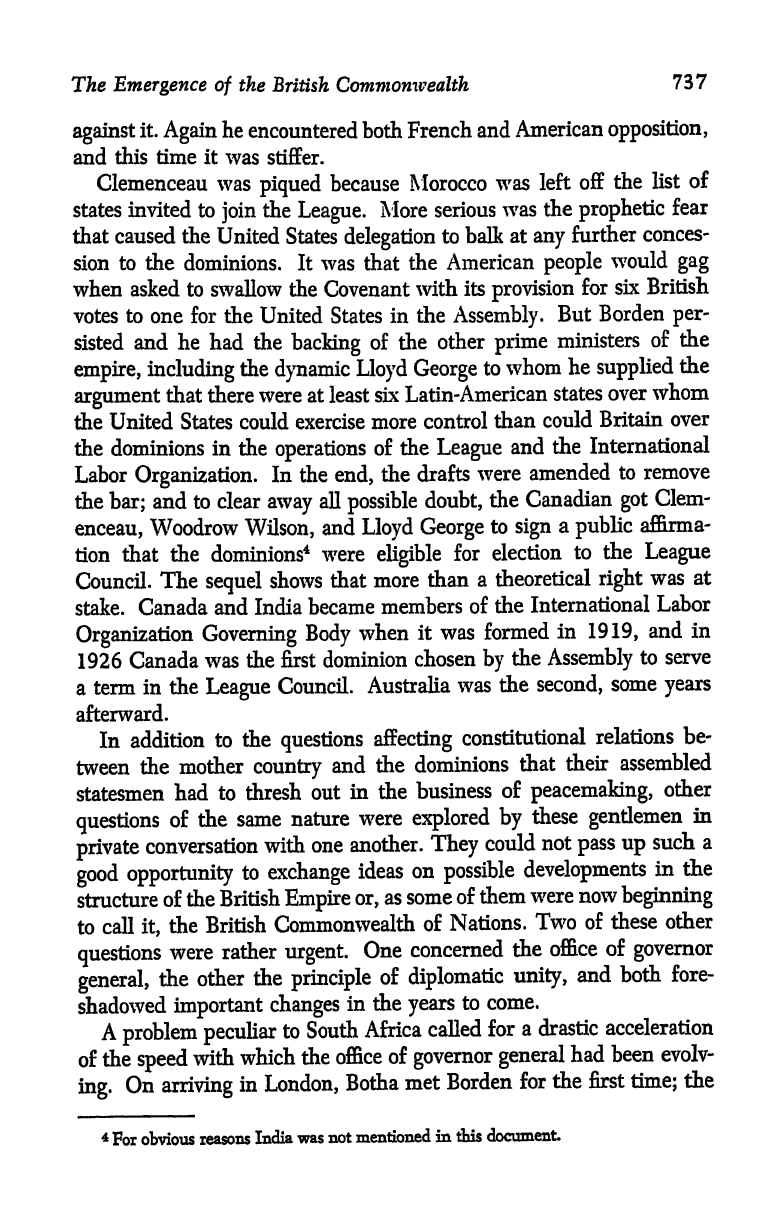
The
Emergence of
the
British Commonwealth
737
against
it.
Again
he
encountered
both French
and
American
opposition,
and
this
time
it
was staffer.
Clemenceau
was
piqued
because
Morocco
was
left
off
the
list
of
states invited to
join
the
League.
More
serious
was
the
prophetic
fear
that
caused the
United
States
delegation
to
balk at
any
further
conces-
sion to
the
dominions. It
was that
the American
people
would
gag
when
asked
to swallow the
Covenant
with its
provision
for
six
British
votes
to one
for the United States
in
the
Assembly.
But Borden
per-
sisted
and
he
had
the
backing
of the
other
prime
ministers
of
the
empire,
including
the
dynamic
Lloyd George
to
whom
he
supplied
the
argument
that there were
at
least
six
Latin-American
states
over
whom
the
United
States could
exercise
more
control
than
could
Britain
over
the dominions
in the
operations
of
the
League
and
the
International
Labor
Organization.
In the
end,
the drafts
were
amended
to
remove
the
bar;
and to
clear
away
all
possible
doubt,
the
Canadian
got
Clem-
enceau,
Woodrow
Wilson,
and
Lloyd
George
to
sign
a
public
affirma-
tion
that
the
dominions
4
were
eligible
for
election
to
the
League
Council.
The
sequel
shows
that
more
than
a theoretical
right
was at
stake.
Canada
and
India
became
members
of
the
International
Labor
Organization
Governing
Body
when
it
was formed
in
1919,
and
in
1926
Canada
was
the
first
dominion
chosen
by
the
Assembly
to
serve
a
term
in the
League
Council.
Australia
was
the
second,
some
years
afterward.
In
addition
to
the
questions
affecting
constitutional
relations
be-
tween
the
mother
country
and
the dominions
that
their
assembled
statesmen
had to
thresh
out
in the
business
of
peacemaking,
other
questions
of
the
same
nature
were
explored
by
these
gentlemen
in
private
conversation
with
one
another.
They
could
not
pass
up
such
a
good
opportunity
to
exchange
ideas
on
possible
developments
in
the
structure
of
the
British
Empire
or,
as
some
of
them
were now
beginning
to
call
it,
the
British
Commonwealth
of
Nations.
Two
of
these
other
questions
were
rather
urgent.
One
concerned
the
office
of
governor
general,
the
other
the
principle
of
diplomatic
unity,
and
both
fore-
shadowed
important
changes
in
the
years
to
come.
A
problem
peculiar
to
South
Africa
called
for
a drastic
acceleration
of
the
speed
with
which
the
office
of
governor
general
had been
evolv-
ing.
On
arriving
in
London,
Botha
met
Borden
for
the
first
time;
the
4
For
obvious
reasons
India
was
not
mentioned
in this
document.
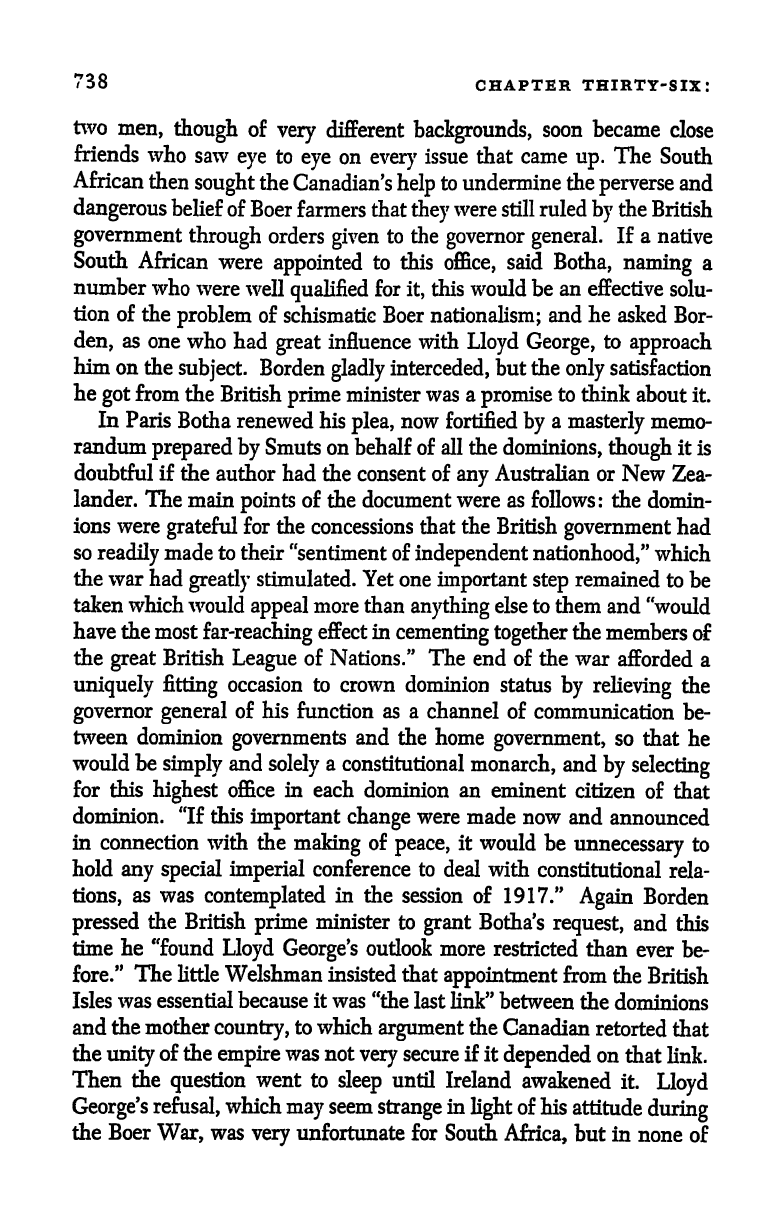
738
CHAPTER
THIRTY-SIX:
two
men,
though
of
very
different
backgrounds,
soon became
close
friends
who saw
eye
to
eye
on
every
issue
that came
up.
The
South
African
then
sought
the
Canadian's
help
to undermine the
perverse
and
dangerous
belief of
Boer
farmers that
they
were still
ruled
by
the
British
government
through
orders
given
to the
governor general.
If a
native
South
African
were
appointed
to
this
office,
said
Botha,
naming
a
number
who were
well
qualified
for
it,
this would be
an
effective
solu-
tion
of
the
problem
of
schismatic
Boer
nationalism;
and
he
asked
Bor-
den,
as
one
who
had
great
influence
with
Lloyd
George,
to
approach
him
on
the
subject.
Borden
gladly
interceded,
but
the
only
satisfaction
he
got
from
the British
prime
minister was
a
promise
to think
about
it.
In Paris
Botha
renewed
his
plea,
now
fortified
by
a
masterly
memo-
randum
prepared by
Smuts
on behalf of all
the
dominions,
though
it
is
doubtful
if the
author had
the
consent of
any
Australian or New
Zea-
lander.
The
main
points
of
the
document were as
follows: the
domin-
ions were
grateful
for
the
concessions that
the
British
government
had
so
readily
made to their
"sentiment of
independent
nationhood,"
which
the war
had
greatly
stimulated.
Yet
one
important step
remained to
be
taken which
would
appeal
more than
anything
else to them
and
"would
have the most
far-reaching
effect in
cementing together
the
members of
the
great
British
League
of
Nations."
The
end of the war
afforded a
uniquely
fitting
occasion
to crown
dominion
status
by
relieving
the
governor general
of
his
function as a
channel of
communication
be-
tween dominion
governments
and the home
government,
so that
he
would be
simply
and
solely
a
constitutional
monarch,
and
by
selecting
for
this
highest
office
in each
dominion an eminent
citizen
of
that
dominion. "If this
important
change
were
made now
and
announced
in connection with the
making
of
peace,
it
would be
unnecessary
to
hold
any
special
imperial
conference to
deal with
constitutional
rela-
tions,
as was
contemplated
in
the
session of 1917."
Again
Borden
pressed
the
British
prime
minister
to
grant
Botha's
request,
and
this
time he "found
Lloyd
George's
outlook more
restricted
than
ever be-
fore."
The little Welshman
insisted that
appointment
from
the
British
Isles
was essential because
it
was
"the
last link"
between the
dominions
and
the
mother
country,
to
which
argument
the
Canadian
retorted that
the
unity
of
the
empire
was not
very
secure if
it
depended
on
that link.
Then the
question
went
to
sleep
until
Ireland
awakened it.
Lloyd
George's
refusal,
which
may
seem
strange
in
light
of
his
attitude
during
the Boer
War,
was
very
unfortunate
for South
Africa,
but
in
none
of
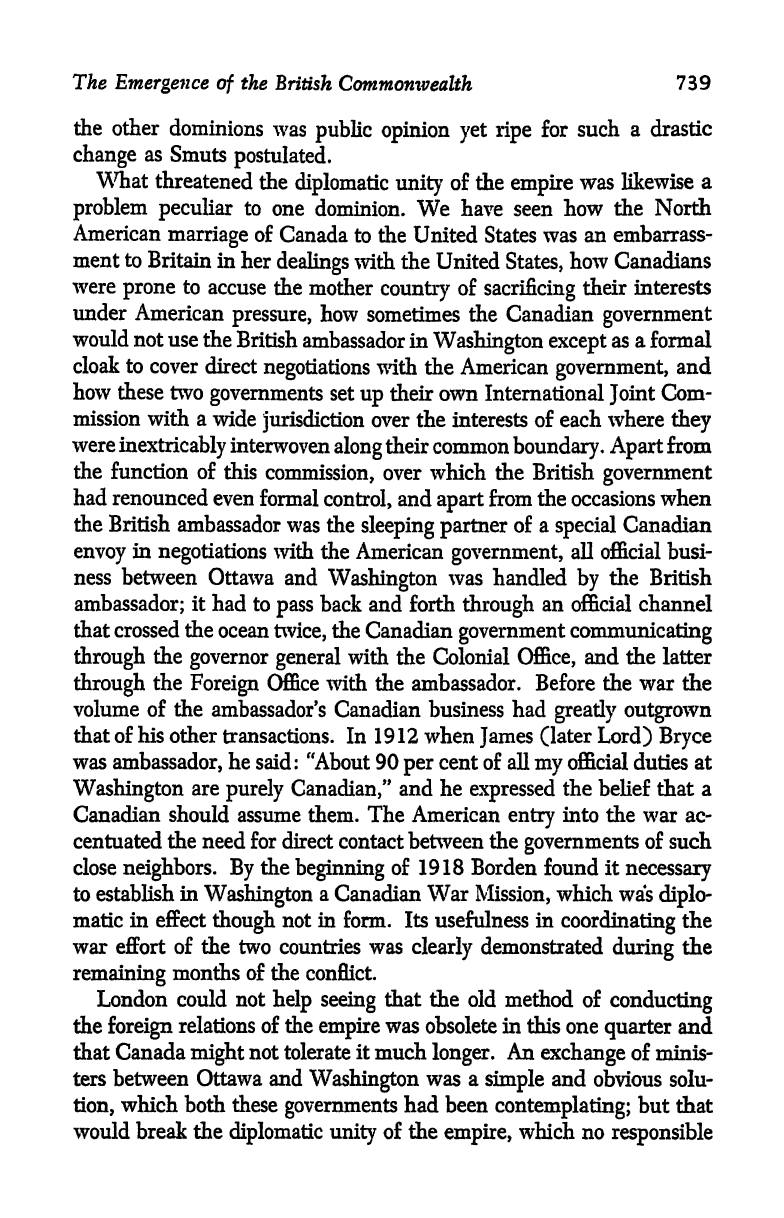
The
Emergence of
the
British
Commonwealth
739
the
other
dominions
was
public
opinion yet
ripe
for
such
a
drastic
change
as
Smuts
postulated.
What
threatened
the
diplomatic
unity
of the
empire
was
likewise
a
problem peculiar
to
one
dominion. We
have
seen
how
the
North
American
marriage
of
Canada
to
the
United
States
was an
embarrass-
ment to
Britain in
her
dealings
with
the
United
States,
how
Canadians
were
prone
to
accuse
the
mother
country
of
sacrificing
their
interests
under
American
pressure,
how
sometimes
the Canadian
government
would not
use
the
British
ambassador
in
Washington
except
as a formal
cloak to cover
direct
negotiations
with
the American
government,
and
how these two
governments
set
up
their
own
International
Joint
Com-
mission with
a
wide
jurisdiction
over the interests of each
where
they
were
inextricably
interwoven
along
their common
boundary.
Apart
from
the
function of
this
commission,
over
which
the
British
government
had
renounced even
formal
control,
and
apart
from
the
occasions
when
the British
ambassador
was the
sleeping
partner
of
a
special
Canadian
envoy
in
negotiations
with
the American
government,
all official
busi-
ness
between
Ottawa
and
Washington
was
handled
by
the British
ambassador;
it
had to
pass
back
and
forth
through
an
official channel
that crossed the
ocean
twice,
the
Canadian
government communicating
through
the
governor
general
with the Colonial
Office,
and the latter
through
the
Foreign
Office
with
the
ambassador.
Before
the war the
volume
of the
ambassador's
Canadian business
had
greatly outgrown
that of his other
transactions.
In 1912 when
James
(later
Lord)
Bryce
was
ambassador,
he
said:
"About
90
per
cent of all
my
official
duties
at
Washington
are
purely
Canadian,"
and he
expressed
the
belief that
a
Canadian
should assume them. The American
entry
into
the
war
ac-
centuated
the
need for direct
contact
between the
governments
of
such
close
neighbors.
By
the
beginning
of 1918 Borden
found
it
necessary
to
establish
in
Washington
a
Canadian War
Mission,
which
was
diplo-
matic in effect
though
not in
form.
Its usefulness in
coordinating
the
war
effort
of the
two countries
was
clearly
demonstrated
during
the
remaining
months of the conflict.
London could not
help
seeing
that the
old method
of
conducting
the
foreign
relations of the
empire
was
obsolete
in
this one
quarter
and
that Canada
might
not
tolerate
it
much
longer.
An
exchange
of
minis-
ters
between Ottawa
and
Washington
was
a
simple
and
obvious solu-
tion,
which both
these
governments
had been
contemplating;
but that
would break
the
diplomatic unity
of the
empire,
which no
responsible
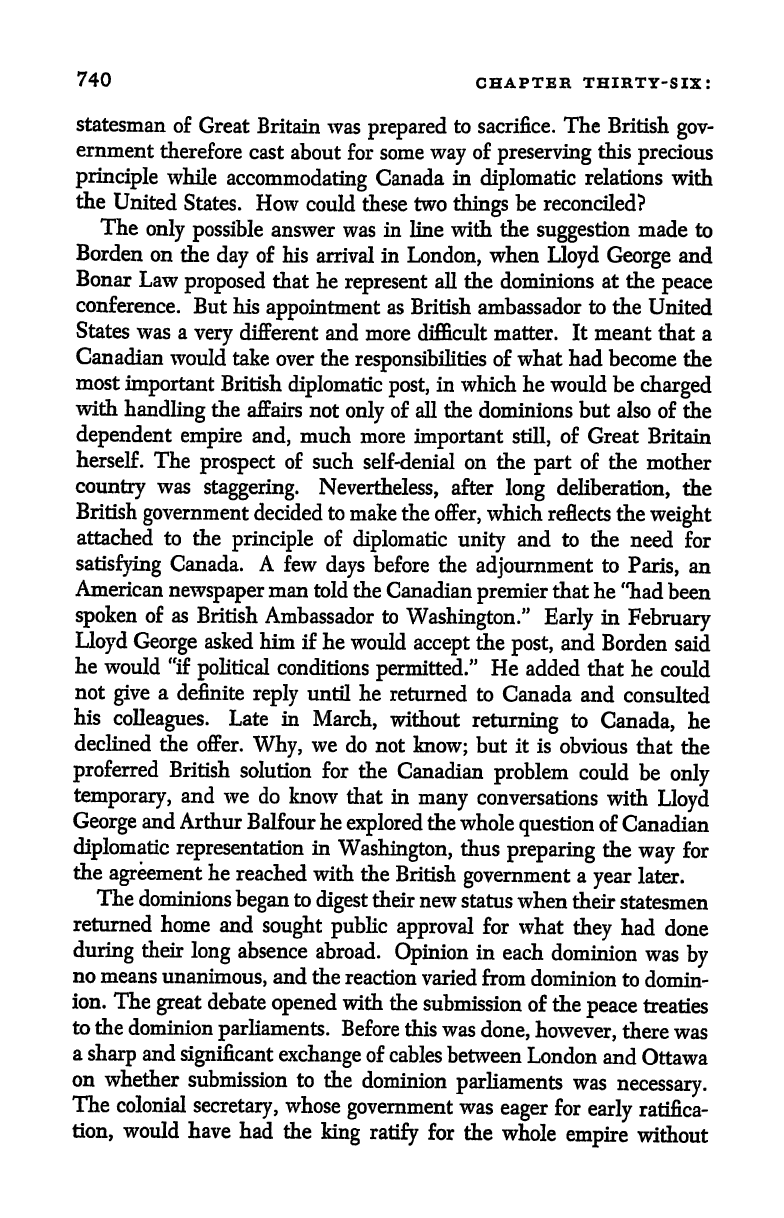
740
CHAPTER
THIRTY-SIX:
statesman
of
Great
Britain
was
prepared
to sacrifice.
The British
gov-
ernment
therefore
cast
about
for
some
way
of
preserving
this
precious
principle
while
accommodating
Canada
in
diplomatic
relations
with
the
United
States.
How
could these two
things
be reconciled?
The
only
possible
answer
was
in
line
with the
suggestion
made
to
Borden
on
the
day
of his
arrival
in
London,
when
Lloyd
George
and
Bonar
Law
proposed
that he
represent
all
the dominions
at the
peace
conference.
But his
appointment
as British ambassador
to
the
United
States
was a
very
different
and
more
difficult
matter. It
meant
that
a
Canadian
would take
over the
responsibilities
of
what had
become
the
most
important
British
diplomatic
post,
in which he
would be
charged
with
handling
the
affairs
not
only
of
all
the
dominions but
also of
the
dependent
empire
and,
much more
important
still,
of
Great
Britain
herself.
The
prospect
of such
self-denial
on
the
part
of the
mother
country
was
staggering.
Nevertheless,
after
long
deliberation,
the
British
government
decided
to
make
the
offer,
which
reflects the
weight
attached to
the
principle
of
diplomatic
unity
and to
the
need for
satisfying
Canada.
A
few
days
before the
adjournment
to
Paris,
an
American
newspaper
man
told
the Canadian
premier
that
he
"had
been
spoken
of
as
British
Ambassador to
Washington." Early
in
February
Lloyd
George
asked
him if
he would
accept
the
post,
and
Borden
said
he
would "if
political
conditions
permitted/
1
He added
that
he
could
not
give
a
definite
reply
until he
returned to
Canada
and
consulted
his
colleagues.
Late
in
March,
without
returning
to
Canada,
he
declined
the
offer.
Why,
we
do
not
know;
but it
is
obvious
that
the
preferred
British
solution
for the
Canadian
problem
could
be
only
temporary,
and
we
do
know
that in
many
conversations with
Lloyd
George
and Arthur
Balfour he
explored
the
whole
question
of
Canadian
diplomatic
representation
in
Washington,
thus
preparing
the
way
for
the
agreement
he
reached with
the
British
government
a
year
later.
The
dominions
began
to
digest
their new
status
when
their
statesmen
returned
home
and
sought public
approval
for what
they
had
done
during
their
long
absence
abroad.
Opinion
in
each
dominion
was
by
no
means
unanimous,
and
the
reaction
varied
from
dominion to
domin-
ion.
The
great
debate
opened
with
the
submission
of
the
peace
treaties
to
the
dominion
parliaments.
Before
this
was
done,
however,
there
was
a
sharp
and
significant
exchange
of
cables
between
London
and
Ottawa
on
whether
submission to
the
dominion
parliaments
was
necessary.
The
colonial
secretary,
whose
government
was
eager
for
early
ratifica-
tion,
would
have
had the
king
ratify
for
the
whole
empire
without
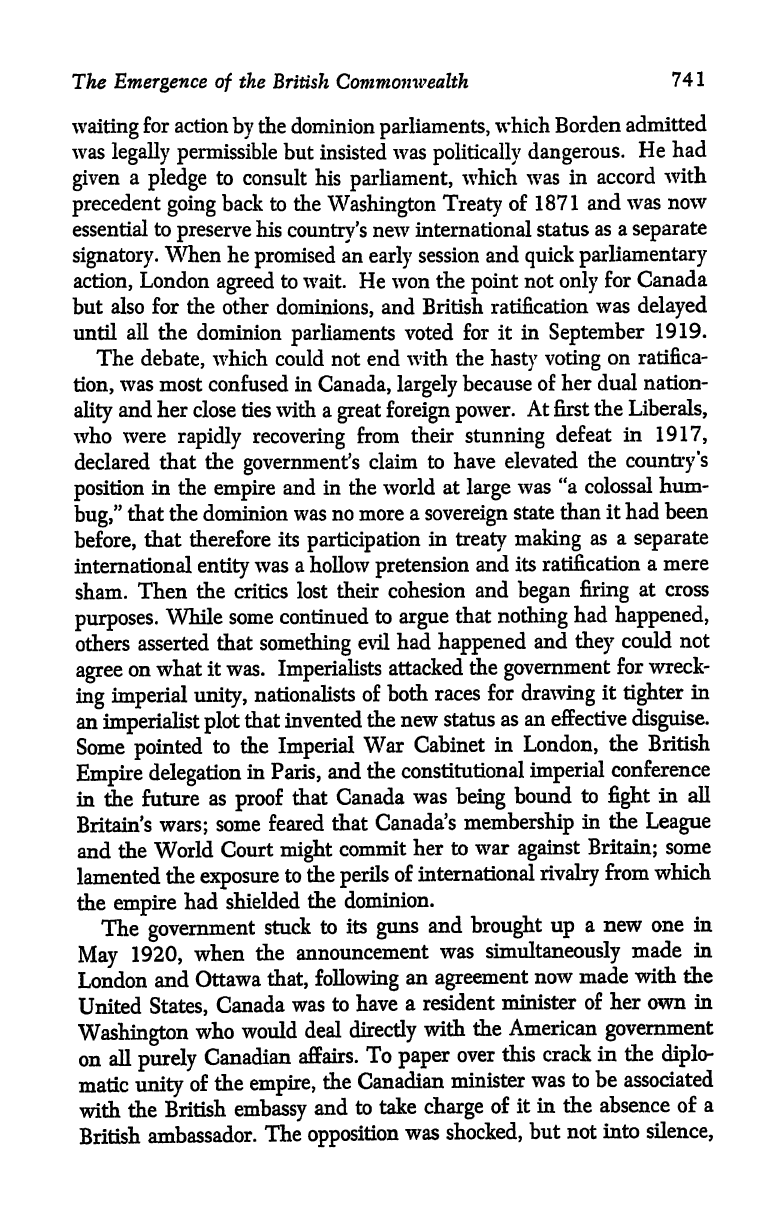
The
Emergence
of
the British
Commonwealth
74
1
waiting
for action
by
the
dominion
parliaments,
which
Borden
admitted
was
legally
permissible
but
insisted
was
politically
dangerous.
He
had
given
a
pledge
to
consult his
parliament,
which
was
in
accord
with
precedent going
back to the
Washington
Treaty
of
1871
and
was
now
essential
to
preserve
his
country's
new international
status
as
a
separate
signatory.
When he
promised
an
early
session
and
quick
parliamentary
action,
London
agreed
to
wait.
He
won the
point
not
only
for Canada
but
also for the other
dominions,
and
British
ratification
was
delayed
until
all
the
dominion
parliaments
voted
for it
in
September
1919.
The
debate,
which could not end with
the
hasty
voting
on
ratifica-
tion,
was
most
confused in
Canada,
largely
because
of
her dual
nation-
ality
and
her close ties with
a
great foreign
power.
At first
the
Liberals,
who
were
rapidly
recovering
from
their
stunning
defeat
in
1917,
declared
that the
government's
claim
to have
elevated
the
country's
position
in
the
empire
and in the world
at
large
was
"a colossal
hum-
bug,"
that the
dominion was
no more
a
sovereign
state
than
it
had
been
before,
that therefore
its
participation
in
treaty
making
as
a
separate
international
entity
was
a
hollow
pretension
and its
ratification
a mere
sham.
Then
the critics
lost
their cohesion
and
began
firing
at
cross
purposes.
While some
continued
to
argue
that
nothing
had
happened,
others
asserted
that
something
evil
had
happened
and
they
could
not
agree
on
what
it was.
Imperialists
attacked
the
government
for
wreck-
ing
imperial
unity,
nationalists
of
both
races
for
drawing
it
tighter
in
an
imperialist
plot
that invented
the
new
status
as
an
effective
disguise.
Some
pointed
to
the
Imperial
War
Cabinet
in
London,
the British
Empire
delegation
in
Paris,
and
the
constitutional
imperial
conference
in
the
future
as
proof
that
Canada
was
being
bound
to
fight
in all
Britain's
wars;
some
feared
that
Canada's
membership
in
the
League
and the
World
Court
might
commit
her to
war
against
Britain;
some
lamented
the
exposure
to
the
perils
of
international
rivalry
from
which
the
empire
had
shielded
the
dominion.
The
government
stuck
to
its
guns
and
brought
up
a
new
one
in
May
1920,
when
the
announcement
was
simultaneously
made
in
London
and
Ottawa
that,
following
an
agreement
now
made
with
the
United
States,
Canada
was
to have
a resident
minister
of
her
own
in
Washington
who
would
deal
directly
with
the
American
government
on
all
purely
Canadian
affairs.
To
paper
over
this crack
in
the
diplo-
matic
unity
of
the
empire,
the Canadian
minister
was to be
associated
with
the
British
embassy
and
to
take
charge
of
it
in
the absence of
a
British
ambassador.
The
opposition
was
shocked,
but not
into
silence,
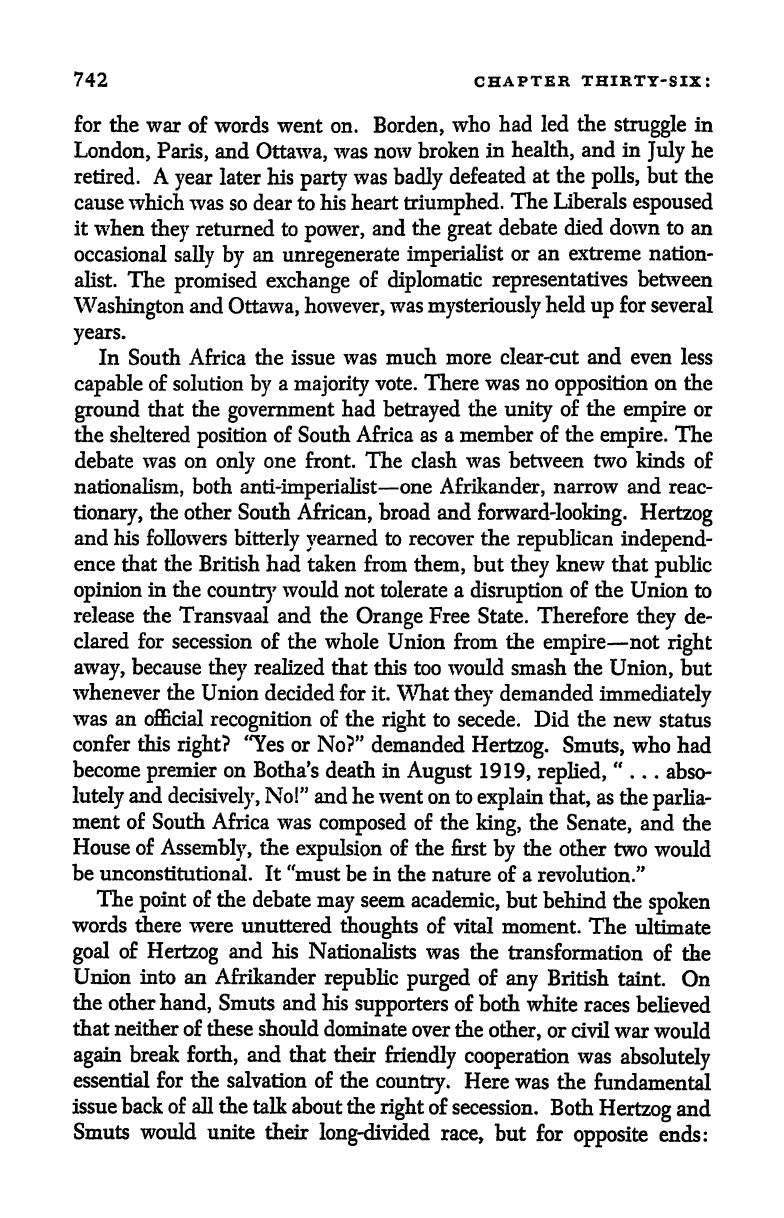
742
CHAPTER THIRTY-SIX:
for the
war
of words
went
on.
Borden,
who
had led
the
struggle
in
London,
Paris,
and
Ottawa,
was
now broken
in
health,
and
in
July
he
retired.
A
year
later
his
party
was
badly
defeated
at the
polls,
but
the
cause
which was
so dear to
his
heart
triumphed.
The
Liberals
espoused
it
when
they
returned to
power,
and
the
great
debate died
down
to
an
occasional
sally
by
an
unregenerate
imperialist
or
an extreme
nation-
alist. The
promised
exchange
of
diplomatic
representatives
between
Washington
and
Ottawa,
however,
was
mysteriously
held
up
for
several
years.
In
South
Africa
the issue
was much more
clear-cut
and even
less
capable
of
solution
by
a
majority
vote.
There
was
no
opposition
on
the
ground
that the
government
had
betrayed
the
unity
of
the
empire
or
the
sheltered
position
of South
Africa as a member of
the
empire.
The
debate was
on
only
one
front. The
clash
was between two
kinds
of
nationalism,
both
anti-imperialist
one
Afrikander,
narrow and reac-
tionary,
the other South
African,
broad and
forward-looking.
Hertzog
and
his
followers
bitterly
yearned
to recover the
republican
independ-
ence
that
the British
had taken from
them,
but
they
knew that
public
opinion
in
the
country
would
not
tolerate
a
disruption
of the
Union
to
release the
Transvaal and the
Orange
Free State. Therefore
they
de-
clared for
secession of the
whole Union from the
empire
not
right
away,
because
they
realized that this
too would
smash
the
Union,
but
whenever
the
Union
decided
for
it.
What
they
demanded
immediately
was an
official
recognition
of the
right
to secede. Did the
new
status
confer
this
right?
'Tes or No?"
demanded
Hertzog.
Smuts,
who
had
become
premier
on
Botha's death in
August
1919,
replied,
"...
abso-
lutely
and
decisively,
No!"
and
he went
on to
explain
that,
as the
parlia-
ment of
South
Africa was
composed
of
the
king,
the
Senate,
and the
House of
Assembly,
the
expulsion
of the
first
by
the other
two
would
be
unconstitutional. It
"must
be in the
nature
of a
revolution."
The
point
of the
debate
may
seem
academic,
but
behind the
spoken
words there
were
unuttered
thoughts
of vital
moment.
The
ultimate
goal
of
Hertzog
and his
Nationalists
was the
transformation
of the
Union into
an
Afrikander
republic
purged
of
any
British
taint.
On
the
other
hand,
Smuts
and
his
supporters
of
both
white
races
believed
that
neither
of these should
dominate
over
the
other,
or
civil
war
would
again
break
forth,
and
that their
friendly
cooperation
was
absolutely
essential for the
salvation of the
country.
Here
was the
fundamental
issue back of all the
talk
about
the
right
of
secession.
Both
Hertzog
and
Smuts would unite their
long-divided
race,
but for
opposite
ends:
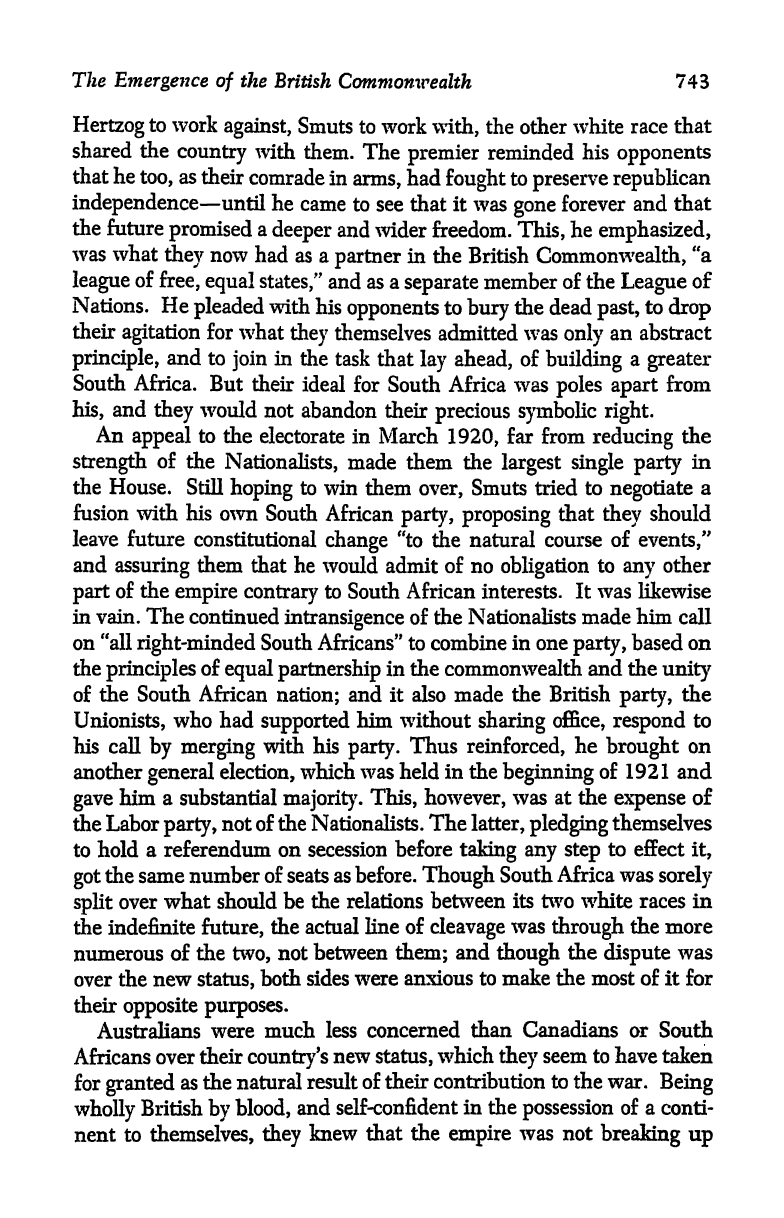
The
Emergence
of
the
British
Commonwealth 743
Hertzog
to
work
against,
Smuts to
work
with,
the
other
white
race
that
shared
the
country
with
them.
The
premier
reminded
his
opponents
that
he
too,
as
their
comrade in
arms,
had
fought
to
preserve
republican
independence
until
he
came
to
see
that it was
gone
forever
and
that
the future
promised
a
deeper
and
wider freedom.
This,
he
emphasized,
was what
they
now had
as a
partner
in the
British
Commonwealth,
"a
league
of
free,
equal
states,"
and as
a
separate
member
of the
League
of
Nations. He
pleaded
with
his
opponents
to
bury
the dead
past,
to
drop
their
agitation
for
what
they
themselves
admitted
was
only
an abstract
principle,
and
to
join
in
the
task
that
lay
ahead,
of
building
a
greater
South
Africa. But
their
ideal
for
South
Africa was
poles
apart
from
his,
and
they
would not
abandon
their
precious symbolic right.
An
appeal
to
the
electorate in
March
1920,
far from
reducing
the
strength
of
the
Nationalists,
made them the
largest
single
party
in
the House.
Still
hoping
to win
them
over,
Smuts
tried
to
negotiate
a
fusion with
his
own
South
African
party,
proposing
that
they
should
leave future
constitutional
change
"to the natural
course
of
events,"
and
assuring
them
that
he
would
admit
of
no
obligation
to
any
other
part
of
the
empire
contrary
to
South
African interests. It was likewise
in vain. The
continued
intransigence
of the
Nationalists made
him
call
on "all
right-minded
South
Africans"
to
combine
in one
party,
based
on
the
principles
of
equal
partnership
in
the
commonwealth
and the
unity
of
tie South
African
nation;
and
it
also made
the
British
party,
the
Unionists,
who had
supported
him without
sharing
office,
respond
to
his call
by
merging
with
his
party.
Thus
reinforced,
he
brought
on
another
general
election,
which was held
in the
beginning
of 1921
and
gave
him
a
substantial
majority.
This, however,
was
at
the
expense
of
the
Labor
party,
not of
the Nationalists. The
latter,
pledging
themselves
to hold
a referendum
on secession
before
taking
any step
to effect
it,
got
the same number
of
seats
as before.
Though
South
Africa was
sorely-
split
over
what should
be
the relations between
its
two
white races
in
the indefinite
future,
the actual line of
cleavage
was
through
the more
numerous
of the
two,
not
between
them;
and
though
the
dispute
was
over the new
status,
both
sides
were
anxious to make
the
most of it
for
their
opposite
purposes.
Australians
were much less concerned
than
Canadians
or South
Africans
over
their
country's
new
status,
which
they
seem to
have taken
for
granted
as
the natural
result
of their contribution
to
the
war.
Being
wholly
British
by
blood,
and self-confident
in
the
possession
of
a
conti-
nent
to
themselves,
they
knew
that the
empire
was
not
breaking up
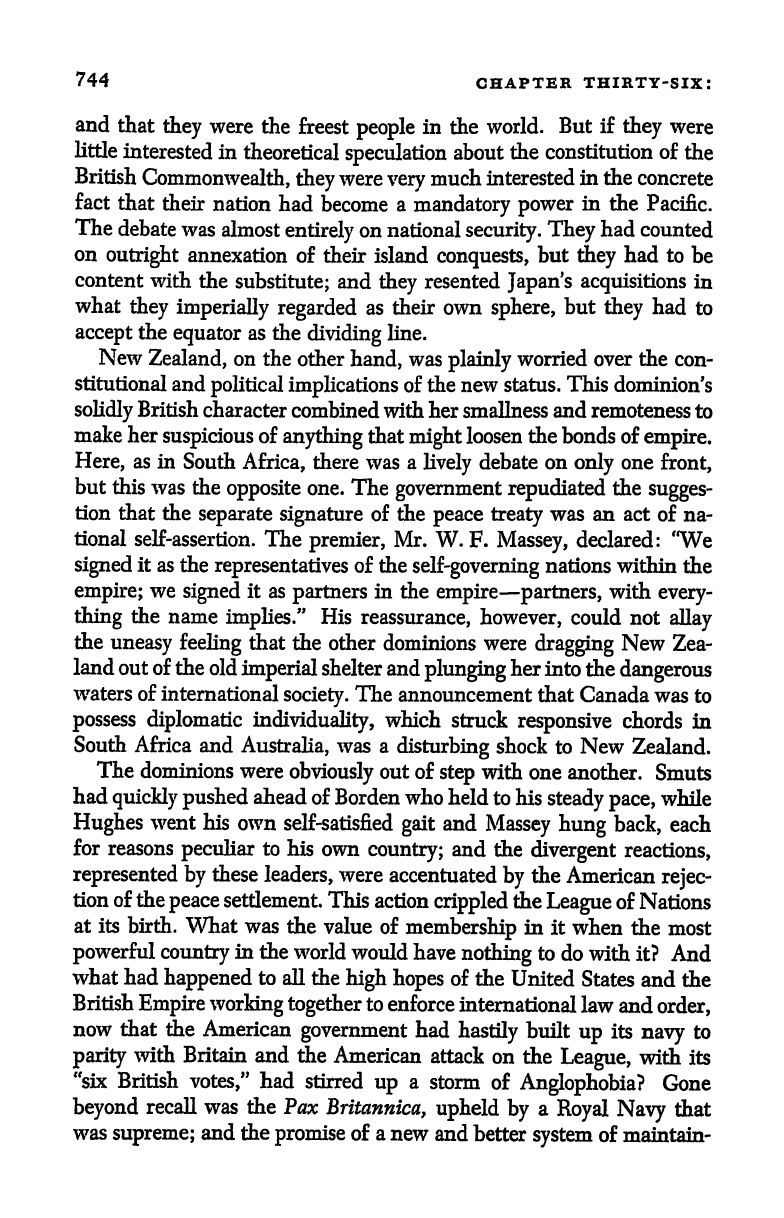
744
CHAPTER
THIRTY-SIX:
and
that
they
were
the
freest
people
in
the
world.
But if
they
were
little
interested in
theoretical
speculation
about
the constitution of
the
British
Commonwealth,
they
were
very
much
interested
in the
concrete
fact
that
their
nation
had
become
a
mandatory
power
in
the
Pacific.
The
debate
was
almost
entirely
on national
security. They
had
counted
on
outright
annexation
of their
island
conquests,
but
they
had
to
be
content
with
the
substitute;
and
they
resented
Japan's acquisitions
in
what
they
imperially
regarded
as
their
own
sphere,
but
they
had
to
accept
the
equator
as
the
dividing
line.
New
Zealand,
on the
other
hand,
was
plainly
worried
over
the
con-
stitutional
and
political
implications
of
the new status.
This
dominion's
solidly
British
character
combined
with
her smallness
and
remoteness
to
make her
suspicious
of
anything
that
might
loosen
the
bonds of
empire.
Here,
as
in
South
Africa,
there
was
a
lively
debate on
only
one
front,
but
this was the
opposite
one.
The
government
repudiated
the
sugges-
tion
that
the
separate
signature
of
the
peace treaty
was an
act
of
na-
tional
self-assertion. The
premier,
Mr.
W.
F.
Massey,
declared:
"We
signed
it
as
the
representatives
of
the
self-governing
nations within
the
empire;
we
signed
it as
partners
in the
empire
partners,
with
every-
thing
the
name
implies."
His
reassurance,
however,
could not
allay
the
uneasy
feeling
that
the other
dominions were
dragging
New Zea-
land out of
the
old
imperial
shelter
and
plunging
her
into
the
dangerous
waters of
international
society.
The
announcement that
Canada
was
to
possess
diplomatic
individuality,
which
struck
responsive
chords in
South Africa
and
Australia,
was a
disturbing
shock
to
New
Zealand.
The
dominions
were
obviously
out
of
step
with
one
another.
Smuts
had
quickly
pushed
ahead
of Borden
who
held to
his
steady pace,
while
Hughes
went
his
own
self-satisfied
gait
and
Massey
hung
back,
each
for reasons
peculiar
to
his own
country;
and
the
divergent
reactions,
represented
by
these
leaders,
were
accentuated
by
the
American
rejec-
tion of the
peace
settlement.
This action
crippled
the
League
of
Nations
at
its birth. What
was
the
value
of
membership
in
it when
the
most
powerful
country
in
the
world
would have
nothing
to
do
with
it?
And
what had
happened
to
all the
high
hopes
of the
United
States and the
British
Empire
working together
to
enforce
international law
and
order,
now
that
die
American
government
had
hastily
built
up
its
navy
to
parity
with Britain
and the
American
attack
on the
League,
with
its
"six
British
votes,"
had
stirred
up
a
storm
of
Anglophobia?
Gone
beyond
recall was
the
Pax
Britannica,
upheld
by
a
Royal
Navy
that
was
supreme;
and
the
promise
of
a
new
and
better
system
of maintain-
